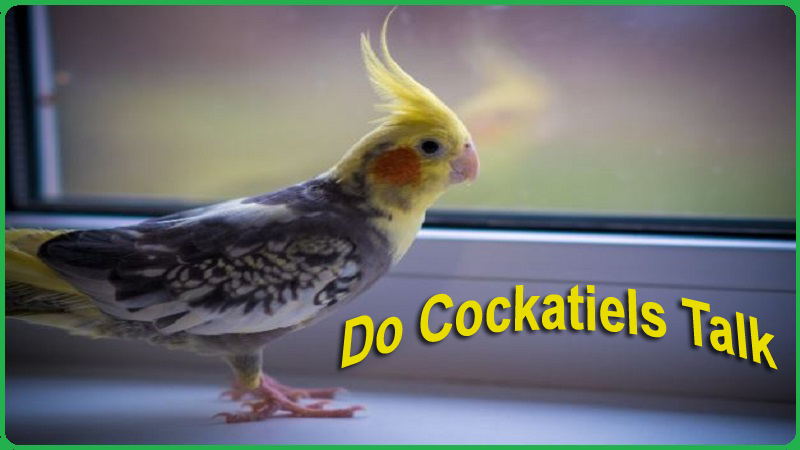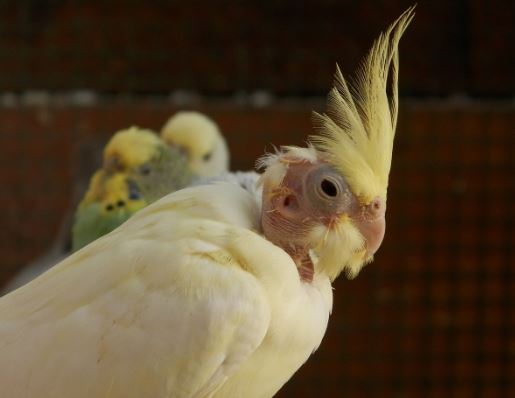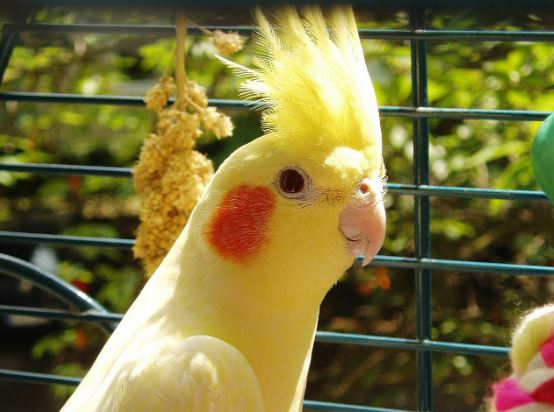Cockatiels like to do dance and singing. But do cockatiels talk as well? Can they easily understand what we want to say them? Let’s get start to explore the fascinating world of cockatiel vocalizations.
Most of cockatiel owners have many questions about “can cockatiels talk?” If you haven’t enough time, then short answer is ‘Yes’, they are capable. However, cockatiel’s speech range and vocal capabilities are not clear and extensive as other parrot species.
Cockatiels are going to know for their charming and amazing vocalizations. But, cockatiels have different speech capabilities from those of larger parrot species.
Can Cockatiels Talk and Mimic?
Cockatiels have talent to produce mimics. They can also learn to replicate a large variety of sounds, like as human speech and melodies. These birds have a unique vocal apparatus (syrinx) that help them to mimic sounds effectively.
Cockatiels are also capable to imitate human music with their whistle-like vocal sounds, and get synchronize their vocal timing with melodies. You should keep patience, consistency, and positive reinforcement, when you train your cockatiel to talk.

All cockatiels unable talk or mimic sounds; generally males are more vocal and produce to mimic sounds as compared females. Overall, cockatiels have remarkable capabilities to mimic sounds and engage in vocal interactions.
At What Age Do Cockatiels Start Talking?
Generally, cockatiels can start vocalizing at their young age, around 3 to 6 months old. However, the capability to mimic specific words or phrases varies from bird to bird.
Some cockatiels parrots may start mimicking sounds and words within their first year. But, others may take longer or never develop this ability. Most of time, It depends on the every bird’s temperament, environment, amount of interaction, and training they obtain from their human companions.
If you provide training at regular basis with patience, then cockatiel can start talking and mimicking at an earlier age.
What Sounds Can Cockatiels Mimic?
Cockatiels are capable of mimicking a variety of sounds, although their repertoire may vary from bird to bird. Some common sounds that cockatiels can mimic include:
Also Read: Can Parrotlets Talk? Myth or Reality
Whistles: Cockatiels are adept whistlers, and can mimic various tunes, melodies, and even human whistling.
Human Speech: While not all cockatiels will learn to speak words, many can mimic simple words or phrases. Common phrases like “hello,” “good bird,” and their own name are often taught to pet cockatiels.
Environmental Sounds: Cockatiels may mimic sounds they hear in their environment, such as household noises (e.g., doorbells, telephones, microwave beeps), or even the sound of running water.
Other Bird Calls: Cockatiels might imitate the calls of other birds they hear, both in the wild and in captivity.
Musical Tunes: Some cockatiels can mimic parts of songs or musical instruments, such as whistling the tune of a favorite song or mimicking the sound of a piano or guitar.
Clicking Sounds: Cockatiels can also learn to mimic clicking sounds, which are often used as training cues or signals.
How Do You Teach A Cockatiel to Talk?
Teaching a cockatiel to talk, you have to require patience, consistency, and a positive training environment. Here, we will cover some essential steps to teach a cockatiel to talk:
Also Read: Can Macaws Talk? Exploring Macaw Vocalizations
Bonding with Your Bird
Before going to start talking training; you should make bonding with your cockatiel by giving it lots of attention and affection. This process helps to make the bird feel comfortable with you and successful training. Spend more quality time with your parrot, including feeding, playing, and simply interacting with it.
Creating a Conducive Learning Environment
Ensure your cockatiel is healthy, happy, and in a comfortable environment. A healthy bird is more likely to be receptive to learning. You should provide a comfortable cage with enough space and balanced diet.
Training in a Quiet Place
Choose a quiet place without getting any distractions for training. This helps your bird focus on you and your words. If your bird is easily distracted, you can even cover its cage to eliminate visual distractions.
Introducing Phrases
Introduce one simple phrase at a time, using a high-pitched voice since cockatiels have high-pitched voices. Start with the bird’s name, simple phrase like “hello” or “good morning.” Use phrases you say frequently, and make sure to use them at the right time.
Focus on Words the Bird Likes
You make focus on words that your bird seems to like or respond to. Look for signs like the bird’s eyes getting larger or its pupils dilating when you say a certain word. This indicates the bird is interested in the word, and more likely to repeat it.
Repeating the Phrase and Being Patient
You should repeat the phrase often and be patient. Don’t lose your patience by yelling or making sudden movements, because this can scare your bird and deter it from talking. Instead, reward your bird with treats, and praise when it says the phrase correctly.
Strengthening the Behavior with Positive Reinforcement
Strengthen the talking behavior with positive reinforcement. Use treats and praises to encourage your bird to repeat the phrase. You can also whistle a tune to your cockatiel repeatedly to get it to repeat that.
Complicating and Increasing the Phrases
Once your bird has mastered a phrase; you can gradually introduce more complex phrases or increase the number of phrases you teach. Remember to keep the phrases simple and high-pitched. You should always use positive reinforcement to encourage your bird to learn.
Cockatiels Natural Sounds
Cockatiels are talented mimics and can learn to replicate a wide variety of sounds, including:
Also Read: Do Cockatoos Talk? Talking Abilities of Cockatoos
Whistling: Cockatiels are excellent whistlers and often produce melodious tunes. They can mimic simple melodies and even some tunes they hear frequently.
Chirping: These are short, sharp sounds that can be a sign of happiness, excitement, or a way to get attention. Chirps can vary in pitch and duration.
Chattering: This consists of softer, continuous sounds. Chattering can occur when cockatiels are relaxed or communicating with other birds.
Screaming: While not the most pleasant sound, cockatiels may scream loudly when they feel scare, distress, or seeking attention. This is a natural behavior often seen in wild birds as a warning signal.
Beak Grinding: When content and relaxed, cockatiels often grind their beaks. This sound is a soft, repetitive noise indicating that the bird is comfortable.
Contact Calls: These are sounds made by cockatiels to keep in touch with their flock, which in a domestic setting often means their human caregivers. It’s a way for them to check in and make sure everyone is nearby.
Hissing: This is a defensive sound cockatiels make when they feel threatened or scared. It’s a warning sign to stay away.
Imitative Sounds: Cockatiels are known to mimic sounds they hear regularly in their environment, such as alarms, phone ringtones, or other household noises.
Can Cockatiels Recognize Their Owner’s Voice?
Yes! Cockatiels are able to recognize their owners’ voices. Through regular interactions, cockatiels quickly learn to recognize their owner’s voice. They can easily identify their owner’s voice, pick up behavioral cues, and can respond with unique behaviors.
Cockatiels come in intelligent and perceptive birds, because they can make sound social bonding with their owners, and showing affection through their responses to their owner’s voice.
FAQs (Frequently Asked Questions)
Do Cockatiels Speak to Each Other?
Yes! Cockatiels do talk with each other. They use different sounds, pitches, and tones to make communication distinct messages, including social interactions, emotions, and responses to potential threats. Cockatiels in pairs may get bonding with each other more than with humans that making them less likely to talk to their owners.
Do All Cockatiels Talk?
Not, all cockatiels to talk. Especially, males can mimic human speech, but it depends on individual ability, training, and environment. Regular interaction and positive reinforcement can increase the likelihood, but many cockatiels communicate through whistling and chirping instead. Each bird’s potential varies.
How Many Words Can a Cockatiel Learn?
Cockatiels are most eminent bird, cause of ability to mimic human speech and can learn a significant number of words. According to various sources, a cockatiel’s vocabulary can range from around 90 words to as many as 250 words.
Are Male or Female Cockatiels Better at Talking?
Male cockatiels are generally more likely to talk as compared females, and often have a larger vocabulary.
Final Lines
Make ensure that now you have been fully educated about ‘Do Cockatiels Talk or Not‘; as well as their essential tips and tricks regarding ‘how do you teach a cockatiel to talk?’ with ease.
If this article is fruitful for you, then please share it along with your friends, family members, parrot lovers or relatives over social media platforms like as Facebook, Instagram, Linked In, Twitter, and more.
Also Read: Why Do Parrots Shake Their Heads? Causes and Insights
Do you have any experience, tips, tricks, or query regarding on this? You can drop a comment!
Have a Nice Day!!






